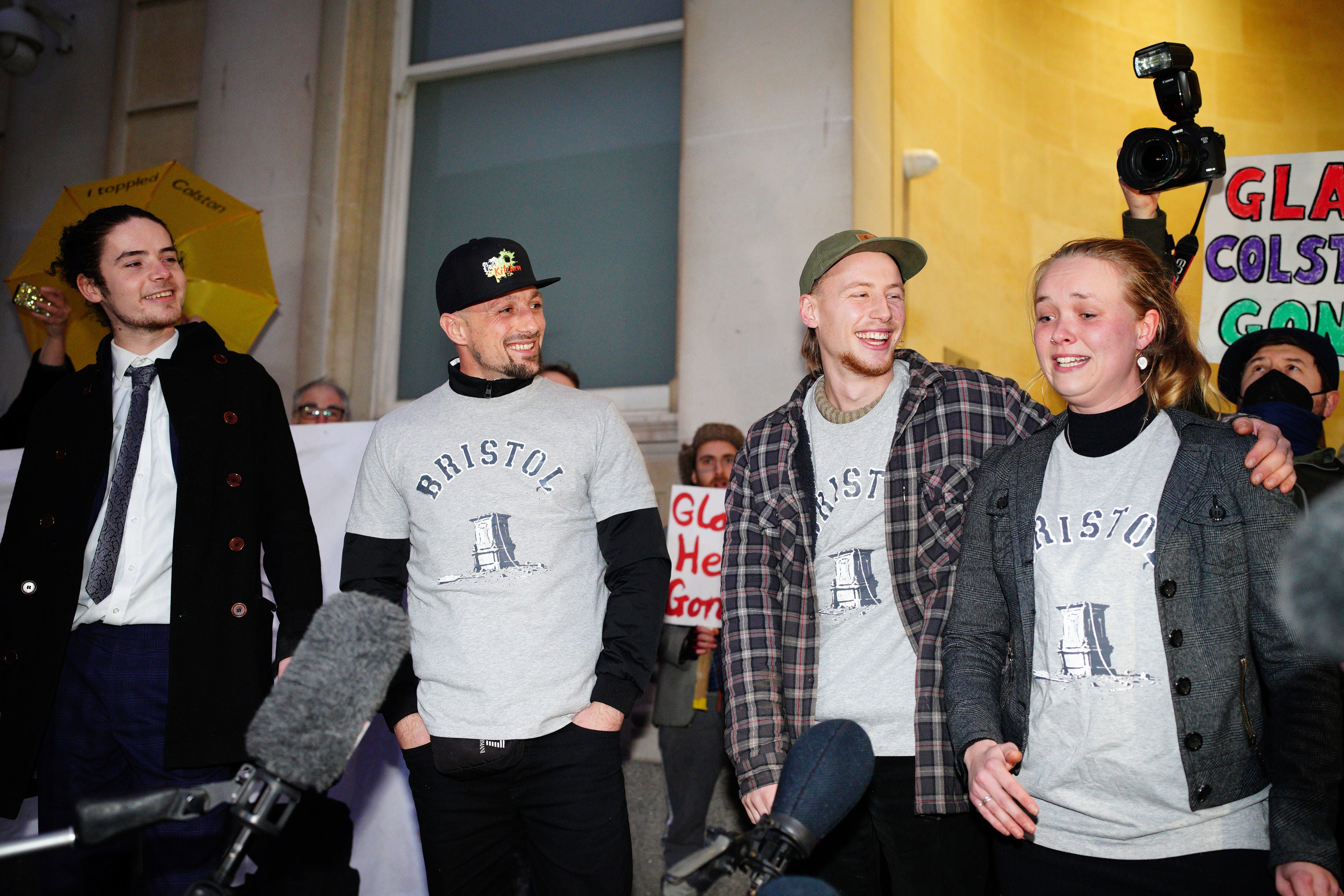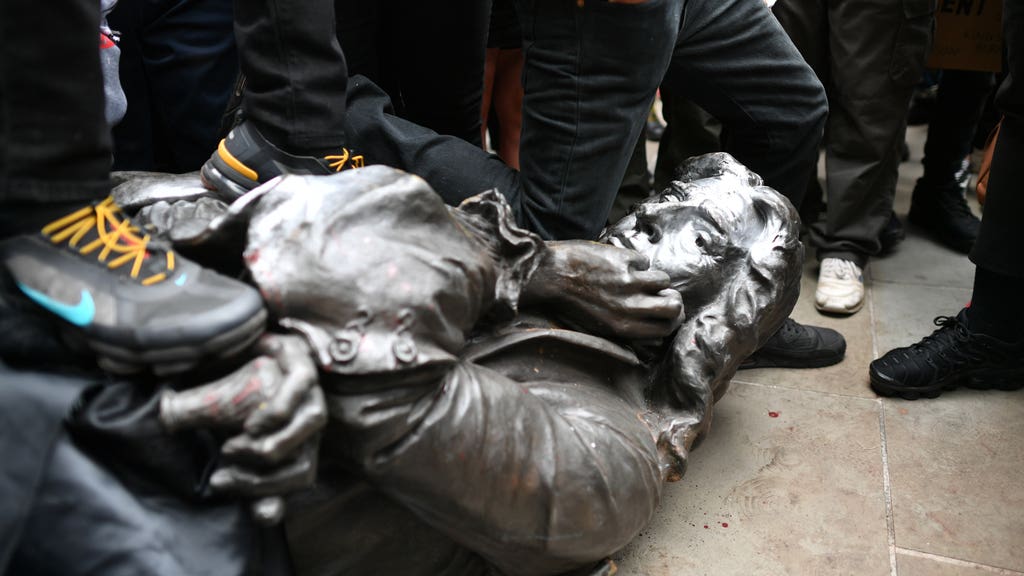Edward Colston statue: Race campaigners say ‘justice has been done’ after four cleared of criminal damage
‘We didn’t change history, we rectified it’
Your support helps us to tell the story
From reproductive rights to climate change to Big Tech, The Independent is on the ground when the story is developing. Whether it's investigating the financials of Elon Musk's pro-Trump PAC or producing our latest documentary, 'The A Word', which shines a light on the American women fighting for reproductive rights, we know how important it is to parse out the facts from the messaging.
At such a critical moment in US history, we need reporters on the ground. Your donation allows us to keep sending journalists to speak to both sides of the story.
The Independent is trusted by Americans across the entire political spectrum. And unlike many other quality news outlets, we choose not to lock Americans out of our reporting and analysis with paywalls. We believe quality journalism should be available to everyone, paid for by those who can afford it.
Your support makes all the difference.Race equality campaigners have welcomed the news that four protesters have been cleared of criminal damage over the toppling of the statue of the Bristol slave trader Edward Colston, hailing the defendants as “heroes”.
Rhian Graham, 30, Milo Ponsford, 26, Sage Willoughby, 22 and Jake Skuse, 33 – who became known as the “Colston Four” – were caught on CCTV passing the ropes around the bronze memorial that were used to pull it down during a Black Lives Matter protest in June 2020, before it was rolled into the water.
Although a huge crowd was involved in the event, only four faced trial and Mr Skuse stood accused of orchestrating a plan to throw it in the harbour.
Weyman Bennett, a co-convenor of the Stand Up to Racism campaign, told The Independent that the Black Lives Matter demonstrations following the murder of George Floyd were a historic response to racism – the legacy of slavery and colonialism – and should be seen as an accomplishment.
“For years, the people of Bristol called for the statue of Edward Colston – a public celebration of a slave trader in the centre of Bristol – to be removed, and finally in June 2020 the people of Bristol pulled the statue down themselves,” he said.
“This historic event should be welcomed and celebrated, not prosecuted.
“We welcome this verdict, and call on all of those who value the right to protest to oppose the government’s draconian policing bill, which will undoubtedly be used to launch further attacks on anti-racist activists.”

Black Lives Matter UK echoed that concern, nodding to a reality in which black people are overrepresented in the criminal justice system.
“They played different roles in the removal of the monument. They are all heroes,” a spokesperson said. “They are also all white. People of colour no longer feel safe to take direct action under this government.”
“As the old saying goes: no justice, no peace. Justice has been done today but BLM UK will not rest until we have black liberation.”
The Colston Four were cleared by a jury at Bristol Crown Court after almost three hours of deliberations following a trial that lasted just over a fortnight.
There were loud cheers from the packed public gallery after the not guilty verdicts were returned.
All four admitted their involvement but denied their actions were criminal, claiming the statue itself had been a hate crime against the people of Bristol.
Outside court, Ms Graham said she was “overwhelmed” by the verdicts, adding: “We just want to say thank you to so many people because we have never been alone in this journey. We have been so supported and we are such a small part of this really.”
Asked what they would say to those who accused them of trying to “change history” by pulling down monuments, Mr Willoughby said: “We didn’t change history. They were whitewashing history by calling [Colston] a f****** virtuous man – sorry to swear. We didn’t change history; we rectified it.”
He continued: “This is a victory for Bristol; this is a victory for racial equality and it’s a victory for anybody who wants to be on the right side of history.”
Raj Chada, who represented Mr Skuse, said: “The truth is that the defendants should never have been prosecuted. It is shameful that Bristol City Council did not take down the statue of slaver Edward Colston that had caused such offence to people in Bristol, and equally shameful that they then supported the prosecution of these defendants.”
Anti-racism campaigner Patrick Vernon said the home secretary, Priti Patel, needed to remove the clause from the Crime and Policing Bill that someone can be charged and convicted for up to 10 years for removing a statue such as the one of Colston.
“The verdict from the jury clearly shows that the government is on the wrong side of history and that the removal of Colston is part of the wider dialogue and consultation that Bristol have been having in the last two decades,” he said.
“I hope this will be part of a process to end the cultural war and government [will] focus on the real work such as ending child poverty and tackling structural racism.”

Lee Jasper, vice-chair of the Bame Lawyers for Justice campaigning group, said: “We are delighted that justice prevailed for our allies and their families.
“This was nothing more than a political show trial demanded by Boris Johnson and Priti Patel in a determined attempt to prosecute an act of moral outrage as a criminal act.
“Whilst we celebrate this victory, it’s important to note that this a is portent of things to come in their Police Crime Bill. The struggle continues.”
An estimated £3,750 of damage was done to the statue – including removing its staff and a coat tail – and £350 of damage to the railings of Pero’s Bridge.
The prosecution argued that the case was a matter of straightforward criminal damage, and the issue of who Colston had been was “irrelevant”.
However, the barristers for all four defendants argued Colston and his legacy were vital in deciding the case.

Join our commenting forum
Join thought-provoking conversations, follow other Independent readers and see their replies
Comments